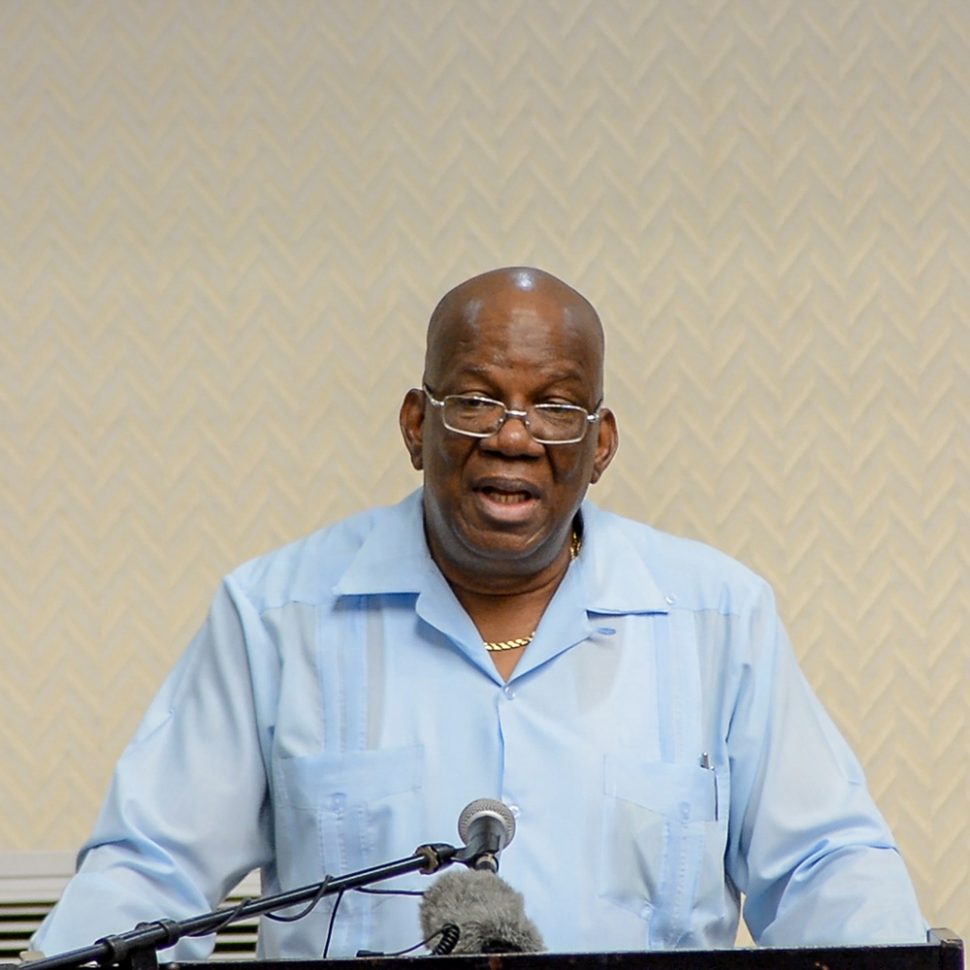With oil production scheduled to commence from March next year, Minister of Finance Winston Jordan says that just above US$100 million will likely be available for Budget spending in 2020.
“I don’t know why they call it first oil revenues. When you speak of first oil, first oil is March. The amount of money you will get from first oil, if you take to the literal meaning, is negligible. In [the] whole year of 2020, and using US$50 per barrel of oil, our take will probably be two hundred and something million. And based on the formula that we have for withdrawal and so on, what you may have available to the budget is one hundred and something million,” Jordan told Stabroek News in an interview last week.
“We did some calculations the other day and we did that figure. Remember, they have to ramp up. They are not going [to produce] 120,000 [barrels of oil] per day in March. They are going to ramp up gradually. That means your take will be increased gradually, until it gets to 120,000 [barrels of oil] and then you get to that three hundred and something million figure. That is the first thing. We cannot sell snake oil. We will not sell snake oil to the population. So no one should use this ‘when the first oil money comes’,” he added.
The Finance Minister said that the impression he gets from some persons is that they believe that oil revenues would be significant from next year. “It gives the impression that like right away, we get US$1 billion available. We don’t, we don’t. We do not have $1 billion unless it accumulates over years. We don’t have a billion United States dollars. That is the first thing we have to understand,” he emphasised.
“Whatever comes will be divided into three parts; whatever comes to the budget, the part we are holding for buffer and the part we are saving for future generations. Don’t give the impression that we get all this money. We are only getting 12.5 percent (of the profit oil) and the royalty,” he added.
Asked questions on the contract, the royalty and government’s take, Jordan said that they should be directed to the Department of Energy (DoE) as that is the agency responsible.
Meanwhile, the DoE last week celebrated one year since its establishment and played up key achievements. Its two-page advertisement was not placed in the Stabroek News but appeared in the other daily newspapers.
“The establishment of the Department is a step forward in ensuring, among other things, capacity building and the strengthening of the legislative framework in the oil and gas sector. Oil production will be the most transformative economic development in Guyana’s history. Its revenues, some of which will be managed by the Natural Resources Fund, will be invested strategically in building human and institutional capacity, addressing infrastructural deficit and providing economic security for future generations,” President David Granger said in a congratulatory message.
Head of the DoE, Dr Mark Bynoe, in his message, said that Guyanese can be assured that the department and partners will continue to work assiduously to reduce value leakages.
Bynoe said that they will “pursue market strategies of Guyana’s crude oil that will bring optimum returns, build out a fit-for-purpose regulatory body, expand the physical and technological capacity within the sector, and focus on making decisions from a position of knowledge.”
Achievements listed by the DoE in its first year are strong inter-agency collaboration, legislative review, completing the final draft of the local content policy, securing more than US$30 million in financing for the sector and finalising a road map outlining Guyana’s management framework for the hydrocarbon sector.
Also, the DoE boasts that it had implemented an internship programme, approved the Liza Phase 2 Project development plan, and completed a new PSA/PSA modelling toolkit to allow probalistic scenario modeling of current and future PSAs, among other things.






